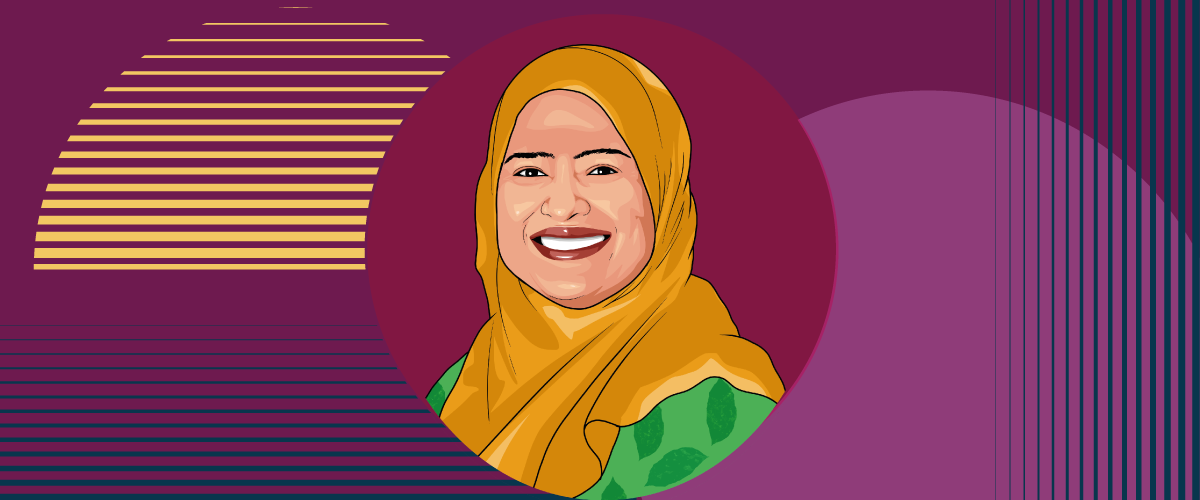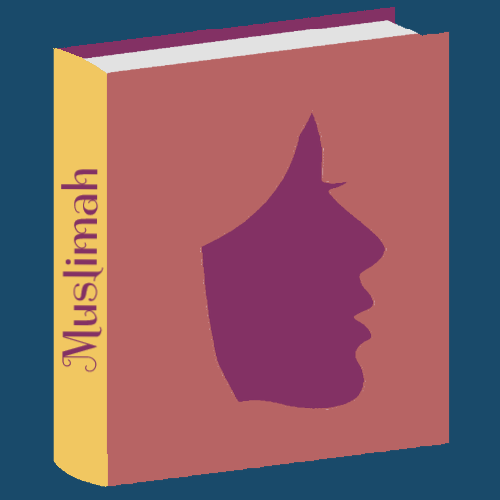
Meet your Neighbour — Zohra Wali
—by Seemab ZahraPeople migrate to far-off lands, leaving behind their comfort zone in search of a place where they can fulfill their dreams, which they would find hard to achieve in their home countries. Such people have stories: stories of struggle and resilience, stories that inspire. One such story is of Zohra Wali — a woman whose fate brought her to a place thousands of miles away from the luxury of her parent’s house.
Zohra, a mother of two boys, was born into a Sindhi family in Karachi, Pakistan. A girl with hazel eyes, she saw the world from a different angle. In 2004, just before finishing her bachelor’s degree in Commerce, she had to leave Pakistan to move to Canada to join her husband. Here she embarked on a journey she had never considered before. Her life in Canada started with a short stay in Windsor, another in Hamilton, and a short while in St. Catharines before finally reaching Kitchener, Ontario. She never knew that this city, Kitchener, which, in the beginning, felt a lot less exciting due to a lack of friends and family, would ultimately become a place where she would find her dreams and meet a community that would give her a sense of belonging for the rest of her life.
Strangers in a new land, Zohra and her husband could not find many friends at first, with only a few immigrants having with similar backgrounds. The only solace they had in their lives was travelling across the United States and Canada. Years went by and connecting with the larger community still was difficult. Zohra tried her best to blend in rather than stand out. She would shy away from people, assuming that they would never want to get to know her. Not recognizing her uniqueness, she started feeling like an outsider. Her loneliness reached its apex when she became a mother. Her constant busy schedule with the new baby did not allow her any time to socialize. That feeling of isolation grew even more when she became a mother for the second time in 2010. Taking responsibility for two kids was not easy.
A few years after moving to Kitchener, Zohra finally found friends she could rely on, hang out with, and connect with. She used to share a lot with her friends, and it seemed that her social and emotional needs were now being met, but deep inside, she still felt like something was missing. Her friends recognized that it was time to pull Zohra out of her bubble and introduce her to a larger community.
Sarah — one of Zohra’s friends was a member of an organization called the Coalition of Muslim Women of Kitchener-Waterloo (CMW) — a registered non-profit organization with a mandate to help create a just and harmonious community where Muslim women are valued, engaged, empowered, and recognized as leaders. Sarah encouraged Zohra to become a part of this organization.
The Coalition offers many volunteering opportunities. Zohra signed up to volunteer for an event that was held at Kitchener City Hall. This was the first time she had volunteered for the community and she met a diverse group of women from all walks of life. They greeted her with an open heart, and not only manifested the sense of unconditional dedication, but also love, support, care, and understanding. In the days following the event, Zohra couldn’t contain her excitement. She kept on telling her husband about the people she had met, and how they made her feel. She had been missing out on a huge opportunity to do something for the better good. Zohra’s husband was very happy that she was finally doing something for herself. Although a few of her friends discouraged her from volunteering for the events as they felt it would not be useful for her career, Zohra continued to volunteer. It was a moment of realization and transformation for Zohra who had just given birth to a baby and was feeling down and socially isolated. Her decision to volunteer for the CMW event changed the course of her life forever.
Soon after becoming a member of the Coalition, the first feather in Zohra’s hat was enrolling and getting selected for the six-week Emerging Leaders Training Program. Every Saturday, a presenter would deliver a workshop on leadership skills and Zohra flourished in these workshops. That leadership training became life changing for her. Through this training, Zohra found a mentor — one of the founding members of CMW — who recognized leadership qualities in her and showed her a direction that she had not considered before.
At the Emerging Leadership Training, Zohra reached out to the coordinator and offered to volunteer for another part of the program where she would be assigned as a liaison to connect the participants with mentors. This allowed Zohra to connect with mainstream political leaders in the Kitchener-Waterloo region, Members of Parliament for Kitchener, and CEOs of large companies. This opportunity to connect with local dignitaries was Zohra’s first experience to learn the essence of being a leader, and to see herself as such a woman, in a country where she was still learning to navigate the system. Soon after the leadership training, Zohra started leading the programs organized by the Coalition.
It wasn’t long before Zohra’s leadership skills were recognized, and in 2015, she was asked by the CMW to co-lead an ongoing project with Ala’ Al-Thibeh — a versatile artist and a dear friend — on an ongoing project called the Illuminate Arts Project. It was one of the biggest youth projects held at THEMUSEUM in Kitchener in 2016, and the first-ever Islamic arts exhibition of its kind in Waterloo Region. Zohra co-led this exhibition for two years, and in April 2016, she represented the CMW at the Canadian Museum Association National Conference held in Halifax. She represented the CMW at that conference within the Muslim Women Arts project capacity. For Zohra, public speaking was a challenge, but getting a chance to address the public at various events organized by the CMW helped her overcome her anxiety. Zohra credits her association with the CMW, the leadership training program, and her mentors for not only enhancing her ability to speak and write better, but also encouraging her to discover her strengths and to believe in her abilities.
Zohra found deep satisfaction in volunteering her time for the community. She continued to organize various events for the CMW such as Break the Fast with Muslim Women, Tea and Tales with Muslim Women, and she also volunteered for a workshop organized by the Contemporary Art Form Kitchener Area at the Family Day event held at Kitchener Farmer’s Market. It was a workshop for event participants to create collaborative contemporary art for windows using Urdu and Arabic script stencils in a calligraphy form. Besides the CMW, Zohra also volunteers at a museum in Kitchener and also at her children’s school.
Sixteen years have passed since Zohra left Pakistan, but the love for her homeland remains in her heart. She shows this love by collecting Pakistani artifacts — especially Sindhi artifacts — and bringing them to various events organized by the CMW. The busy mom also maintains a recipe book. This recipe book is not just a repository of the procedure that connects Zohra’s taste buds with her homeland, but it is an account of memories she has put down and stories of love and belonging. A girl who had never cooked before coming to Canada, she learned the magical recipes from her mother and mother-in-law. She would become all ears when her mother-in -aw cooked, and she would write down every single detail about the recipe. She holds it close to her heart, and whenever someone asks her for a recipe, Zohra is always willing to share her love with them.
Between all these engagements, Zohra’s soft side and her love for creativity still prevails. She finds her happy place in renovation and DIY projects, in painting walls and landscaping. Even the lockdown in the 2020 pandemic could not bring her spirits down. Instead, she made that time memorable: she painted her backyard fence Atlantic blue and landscaped to make room for more plants and flowerpots to go with the fence.
The leading man in Zohra’s journey is her husband, Syed Wali Haider, a man who is always proud of what she does. And not only that, he creates an environment that helps Zohra grow and blossom and uplifts her spirits. When Zohra tries to disparage herself, he motivates her, and lifting her up when she feels down. Her husband is a person who truly values her and brings balance to her life, keeping her grounded and centred when she becomes too occupied with work.
Zohra wants to rewrite the narrative about Desi* women: the misconception that they do not take professional careers seriously and spend most of their lives in close-knit circles. She wants to make it known that Desi women are more than what the world commonly perceives them to be. However, at the same time, she wants to emphasize the support that is derived from family, even if it is only one person in the family. She wants to tell all women of colour to value themselves and not to shy away from trying new things, just as she did.
Zohra learned that there are wonderful people in the world. All she needed to do was extend her hand, and that meeting the right people at the right time can do wonders in a person’s life. From Zohra’s story, one can learn how important it is to go out and meet your neighbour, to get to know people from the larger community, and to tell them about yourself. When Zohra sought to connect with the people outside of her circles, the course of her life changed forever. Becoming a member of the Coalition taught her the importance of unconditional giving — that volunteering her time, with the support of her family, ignited the fire in her to do more — allowing Zohra to blossom into the leader she is today. Zohra currently sits on the board of the Coalition of Muslim Women of KW, and she is completing her Honours Bachelor of Arts degree with Major in Communication Studies from Wilfrid Laurier University in Kitchener, Canada.
*Desi[d̪ayːsi] is derived from the Sanskrit word “day.sh” (or “Day.s” in Urdu) meaning “land, country,” and is used to refer to the people, cultures, and products of the Indian subcontinent; especially, the cultural connection that the diaspora has with the Indian sub-continent — present day India, Pakistan, Bangladesh, and Nepal.
